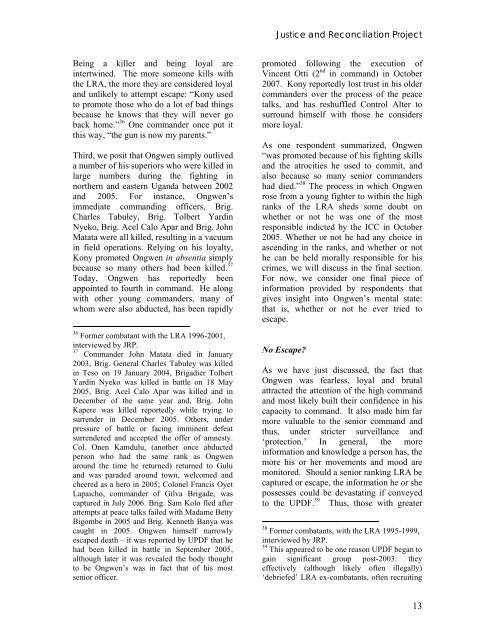zK6mCw
zK6mCw
zK6mCw
Create successful ePaper yourself
Turn your PDF publications into a flip-book with our unique Google optimized e-Paper software.
Justice and Reconciliation Project<br />
Being a killer and being loyal are<br />
intertwined. The more someone kills with<br />
the LRA, the more they are considered loyal<br />
and unlikely to attempt escape: “Kony used<br />
to promote those who do a lot of bad things<br />
because he knows that they will never go<br />
back home.” 36 One commander once put it<br />
this way, “the gun is now my parents.”<br />
Third, we posit that Ongwen simply outlived<br />
a number of his superiors who were killed in<br />
large numbers during the fighting in<br />
northern and eastern Uganda between 2002<br />
and 2005. For instance, Ongwen’s<br />
immediate commanding officers, Brig.<br />
Charles Tabuley, Brig. Tolbert Yardin<br />
Nyeko, Brig. Acel Calo Apar and Brig. John<br />
Matata were all killed, resulting in a vacuum<br />
in field operations. Relying on his loyalty,<br />
Kony promoted Ongwen in absentia simply<br />
because so many others had been killed. 37<br />
Today, Ongwen has reportedly been<br />
appointed to fourth in command. He along<br />
with other young commanders, many of<br />
whom were also abducted, has been rapidly<br />
36 Former combatant with the LRA 1996-2001,<br />
interviewed by JRP.<br />
37<br />
Commander John Matata died in January<br />
2003, Brig. General Charles Tabuley was killed<br />
in Teso on 19 January 2004, Brigadier Tolbert<br />
Yardin Nyeko was killed in battle on 18 May<br />
2005, Brig. Acel Calo Apar was killed and in<br />
December of the same year and, Brig. John<br />
Kapere was killed reportedly while trying to<br />
surrender in December 2005. Others, under<br />
pressure of battle or facing imminent defeat<br />
surrendered and accepted the offer of amnesty.<br />
Col. Onen Kamdulu, (another once abducted<br />
person who had the same rank as Ongwen<br />
around the time he returned) returned to Gulu<br />
and was paraded around town, welcomed and<br />
cheered as a hero in 2005; Colonel Francis Oyet<br />
Lapaicho, commander of Gilva Brigade, was<br />
captured in July 2006. Brig. Sam Kolo fled after<br />
attempts at peace talks failed with Madame Betty<br />
Bigombe in 2005 and Brig. Kenneth Banya was<br />
caught in 2005. Ongwen himself narrowly<br />
escaped death – it was reported by UPDF that he<br />
had been killed in battle in September 2005,<br />
although later it was revealed the body thought<br />
to be Ongwen’s was in fact that of his most<br />
senior officer.<br />
promoted following the execution of<br />
Vincent Otti (2 nd in command) in October<br />
2007. Kony reportedly lost trust in his older<br />
commanders over the process of the peace<br />
talks, and has reshuffled Control Alter to<br />
surround himself with those he considers<br />
more loyal.<br />
As one respondent summarized, Ongwen<br />
“was promoted because of his fighting skills<br />
and the atrocities he used to commit, and<br />
also because so many senior commanders<br />
had died.” 38 The process in which Ongwen<br />
rose from a young fighter to within the high<br />
ranks of the LRA sheds some doubt on<br />
whether or not he was one of the most<br />
responsible indicted by the ICC in October<br />
2005. Whether or not he had any choice in<br />
ascending in the ranks, and whether or not<br />
he can be held morally responsible for his<br />
crimes, we will discuss in the final section.<br />
For now, we consider one final piece of<br />
information provided by respondents that<br />
gives insight into Ongwen’s mental state:<br />
that is, whether or not he ever tried to<br />
escape.<br />
No Escape<br />
As we have just discussed, the fact that<br />
Ongwen was fearless, loyal and brutal<br />
attracted the attention of the high command<br />
and most likely built their confidence in his<br />
capacity to command. It also made him far<br />
more valuable to the senior command and<br />
thus, under stricter surveillance and<br />
‘protection.’ In general, the more<br />
information and knowledge a person has, the<br />
more his or her movements and mood are<br />
monitored. Should a senior ranking LRA be<br />
captured or escape, the information he or she<br />
possesses could be devastating if conveyed<br />
to the UPDF. 39 Thus, those with greater<br />
38 Former combatants, with the LRA 1995-1999,<br />
interviewed by JRP.<br />
39 This appeared to be one reason UPDF began to<br />
gain significant group post-2003: they<br />
effectively (although likely often illegally)<br />
‘debriefed’ LRA ex-combatants, often recruiting<br />
13


